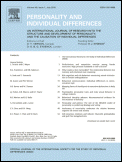Related Research Articles
Psychological testing refers to the administration of psychological tests. Psychological tests are administered or scored by trained evaluators. A person's responses are evaluated according to carefully prescribed guidelines. Scores are thought to reflect individual or group differences in the construct the test purports to measure. The science behind psychological testing is psychometrics.

A personality test is a method of assessing human personality constructs. Most personality assessment instruments are in fact introspective self-report questionnaire measures or reports from life records (L-data) such as rating scales. Attempts to construct actual performance tests of personality have been very limited even though Raymond Cattell with his colleague Frank Warburton compiled a list of over 2000 separate objective tests that could be used in constructing objective personality tests. One exception, however, was the Objective-Analytic Test Battery, a performance test designed to quantitatively measure 10 factor-analytically discerned personality trait dimensions. A major problem with both L-data and Q-data methods is that because of item transparency, rating scales, and self-report questionnaires are highly susceptible to motivational and response distortion ranging from lack of adequate self-insight to downright dissimulation depending on the reason/motivation for the assessment being undertaken.

Perfectionism, in psychology, is a broad personality trait characterized by a person's concern with striving for flawlessness and perfection and is accompanied by critical self-evaluations and concerns regarding others' evaluations. It is best conceptualized as a multidimensional and multilayered personality characteristic, and initially some psychologists thought that there were many positive and negative aspects.
Walter Mischel was an Austrian-born American psychologist specializing in personality theory and social psychology. He was the Robert Johnston Niven Professor of Humane Letters in the Department of Psychology at Columbia University. A Review of General Psychology survey, published in 2002, ranked Mischel as the 25th most cited psychologist of the 20th century.

Lisa Feldman Barrett is a Canadian-American psychologist. She is a University Distinguished Professor of psychology at Northeastern University, where she focuses on affective science and co-directs the Interdisciplinary Affective Science Laboratory. She has received both of the highest scientific honors in the field of psychology, the William James Fellow Award from the Association for Psychological Science for 2025, and the Award for Distinguished Scientific Contributions from the American Psychological Association for 2021. Along with James Russell, she is the founding editor-in-chief of the journal Emotion Review. Along with James Gross, she founded the Society for Affective Science.

Personality and Individual Differences is a peer-reviewed academic journal published 16 times per year by Elsevier. It was established in 1980 by Pergamon Press and is the official journal of the International Society for the Study of Individual Differences. The editors-in-chief are Peter K. Jonason, Julie Aitken Schermer, Aljoscha Neubauer, Michelle Yik and Colin Cooper. Previous editors include Donald H. Saklofske, Philip A. Vernon, Gísli Guðjónsson and Sybil B. G. Eysenck. The founding editor was Hans Jürgen Eysenck. The journal covers research about the structure of personality and other forms of individual differences, the processes which cause these individual differences to emerge, and their practical applications.

The Journal of Personality and Social Psychology is a monthly peer-reviewed scientific journal published by the American Psychological Association that was established in 1965. It covers the fields of social and personality psychology. The editors-in-chief are Shinobu Kitayama, Colin Wayne Leach, and Richard E. Lucas.

John Terrence Cacioppo was the Tiffany and Margaret Blake Distinguished Service Professor at the University of Chicago. He founded the University of Chicago Center for Cognitive and Social Neuroscience and was the director of the Arete Initiative of the Office of the Vice President for Research and National Laboratories at the University of Chicago. He co-founded the field of social neuroscience and was member of the department of psychology, department of psychiatry and behavioral neuroscience, and the college until his death in March 2018.
Raymond S. Dean was an American psychologist and George and Frances Ball Distinguished Professor of Neuropsychology and Professor of Psychology at Ball State University.
Richard E. Petty is university professor of psychology at Ohio State University.

The dark triad is a psychological theory of personality, first published by Delroy L. Paulhus and Kevin M. Williams in 2002, that describes three notably offensive, but non-pathological personality types: Machiavellianism, sub-clinical narcissism, and sub-clinical psychopathy. Each of these personality types is called dark because each is considered to contain malevolent qualities.

David L Wodrich is an American psychologist, professor, researcher, and author. He is currently professor emeritus in the Department of Disability and Psychoeducational Studies at the University of Arizona. He previously held the Mary Emily Warner Professorship of Psychology in Education at Arizona State University.

The Journal of Psychoeducational Assessment is a peer-reviewed academic journal that publishes papers in the field of educational psychology. The journal's editor-in-chief is Donald H. Saklofske. It was established in 1983 and is currently published by SAGE Publications. This journal is a member of the Committee on Publication Ethics (COPE).

Klaus D. Kubinger, is a psychologist as well as a statistician, professor for psychological assessment at the University of Vienna, Faculty of Psychology. His main research work focuses on fundamental research of assessment processes and on application and advancement of Item response theory models. He is also known as a textbook author of psychological assessment on the one hand and on statistics on the other hand.

Canadian Psychology is a quarterly peer-reviewed academic journal published by the American Psychological Association on behalf of the Canadian Psychological Association. The journal was established in 1950 as Canadian Psychologist, later becoming the Canadian Psychological Review in 1975, acquiring its current name in 1980. It and publishes "articles in areas of theory, research, and practice that are potentially of interest to a broad cross-section of psychologists". The editor-in-chief is Don Saklofske.
Delroy L. Paulhus is a personality psychology researcher and professor. He received his doctorate from Columbia University and has worked at the University of California, Berkeley and the University of California, Davis. Currently, Paulhus is a professor of psychology at the University of British Columbia in Vancouver, Canada where he teaches undergraduate and graduate courses. He is best known for being the co creator of the dark triad, along with fellow researcher Kevin Williams.
Marvin Zuckerman was Professor Emeritus of Psychology at the University of Delaware. Zuckerman is best known for his research into the psychobiological basis of human personality, sensory deprivation, mood state measurement, and sensation seeking. His work was particularly inspired by eminent research psychologists, Hans Eysenck and Arnold Buss.
Aurelio José Figueredo is an American evolutionary psychologist. He is a professor of psychology, Family Studies and Human Development at the University of Arizona, where he is also the director of the Ethology and Evolutionary Psychology Laboratory. He is also a member of the interdisciplinary Center for Insect Science at the University of Arizona. His major areas of research interest are the evolutionary psychology and behavioral development of life history strategy, cognition, sex, and violence in human and nonhuman animals, and the quantitative ethology and social development of insects, birds, and primates. He is known for his research on personality, such as a 1997 study in which he and James E. King developed the Chimpanzee Personality Questionnaire to measure the Big Five personality traits in chimpanzees.

In the field of personality psychology, Machiavellianism is the name of a personality trait construct characterized by interpersonal manipulation, indifference to morality, lack of empathy, and a calculated focus on self-interest. Psychologists Richard Christie and Florence L. Geis created the construct and named it after Niccolò Machiavelli, as they used truncated and edited statements similar to his writing style to study variations in human behaviors. The construct's relation to the thinker himself is exclusively nominal. Their Mach IV test, a 20-question, Likert-scale personality survey, became the standard self-assessment tool and scale of the Machiavellianism construct. Those who score high on the scale are more likely to have a high level of manipulativeness, deceitfulness and a cynical, unemotional temperament.
References
- 1 2 "Donald Saklofske". Elsevier. Retrieved 2018-09-24.
- ↑ "Journal of Psychoeducational Assessment". SAGE Publications Inc. 2015-10-28. Retrieved 2018-09-24.